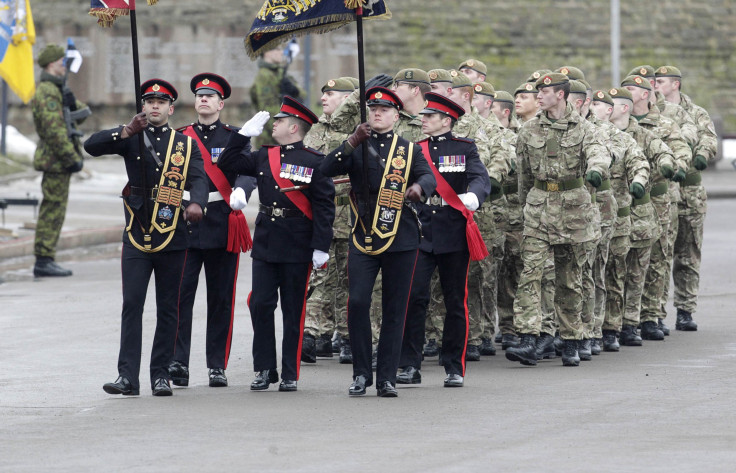American, British Troops Parade Near Russian Border In Estonia

NATO troops took part in a military parade in Estonia, just 300 yards from the Russian border, for the country’s Independence Day Tuesday as tensions between Moscow and the West remain high over the conflict in eastern Ukraine. U.S., British, Dutch, Spanish and Latvian armor and troops joined Estonian forces for the parade, according to the Telegraph, the British paper.
Estonian and NATO officials chose the border city of Narva, where ethnic Russian are the majority, for the parade, a move that the Russian government-owned outlet RT called “an obvious snub.” Estonian Prime Minister Taavi Rõivas, a strong critic of Russian foreign policy, defended the parade.
“Narva is part of NATO no less than New York or Istanbul, and NATO defends every square meter of its territory,” he said in the Estonian capital, Tallinn, according to RT. Estonia and its neighboring Baltic states, Latvia and Lithuania, have been some of Europe’s most vocal critics of Russian intentions ever since they regained their independence from the Soviet Union in 1991. Protests and resistance movements in the Baltic states were fundamental to the overall dissolution of the Soviet Union.
“The events in Ukraine that have kept the entire world awake demonstrate very clearly that we ourselves must maintain security,” said the Estonian chief of staff, Gen. Riho Terras, at Tuesday’s parade.
Estonia joined both NATO and the European Union in 2004. That same year NATO started the Baltic Air Policing Mission, a collective mission meant to reassert the independence of the Baltic states and NATO’s willingness to defend them. It has brought strong criticism from Russia, which sees it as a provocation. NATO’s founding document contains a provision, Article 5, that states an attack on any NATO member state “shall be considered an attack against them all,” and that other member states must help defend the attacked nation.
Because of its significant Russian population and proximity to the border, Estonian officials often point to Narva as a potential flashpoint for a conflict with Russia. Estonian and Lithuanian defense officials have voiced concern over an uptick in Russian military drills near their borders over the last year, drawing parallels to Russia’s actions in Crimea before its annexation in March of last year.
© Copyright IBTimes 2024. All rights reserved.






















